Hydrogen Fuel
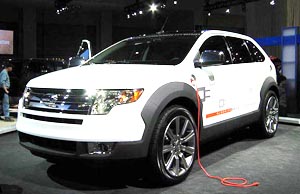
The world pretty much runs on a hydrocarbon fuel economy. Hydrocarbon fossil fuels are the dominant sources for the fuel that we use for our motor vehicles. But, as you have learned, fossil fuels produce all kinds of pollution when used, and their supplies are limited. Using alternative sources of energy, such as wind, water, and the Sun, we can decrease our use of fossil fuels. But these alternative energy sources really only help us to produce heat and electricity for homes and businesses. What about an alternative fuel source for our transportation needs?
Hydrogen is an alternative fuel that can be used to power motor vehicles (cars, trucks, airplanes, etc.). Using hydrogen instead of fossil fuels would eliminate almost all the air pollution we have today. Also, its only byproduct after combustion is water vapor, which is completely non-polluting. Hydrogen is obtained from readily-available water and is thus completely renewable. In light of all of these, some people have argued for a transition from a hydrocarbon economy to a hydrogen economy. Click through the tabs to learn more about hydrogen fuel.
How We Make Hydrogen Fuel
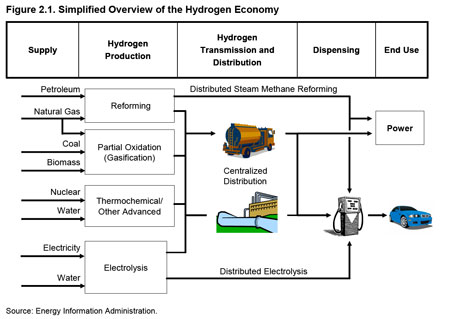
Hydrogen produces very little pollution and it’s made from readily available water, so why is it not used more than fossil fuels? Hydrogen does not exist by itself in nature. We have to extract the hydrogen from hydrogen-bearing compounds like water (H2O). In order to extract the hydrogen from something else, we have to use electricity. So we have to use energy to get energy, and that’s like spending money to get money. One way around this would be if the electricity used to extract hydrogen came from a non-polluting renewable source of energy, like solar power. However, it would take huge amounts of solar cells to produce the electricity we need to produce enough hydrogen for every car in America. The first column of the diagram shows various materials from which hydrogen can be obtained. The second column shows various methods used to extract the hydrogen. Each of those requires the use of some other energy source. The bottom line is that hydrogen is not an energy source like coal or oil. It is a fuel produced by using energy and thus its energy yield will always be low.
Storing Hydrogen Fuel
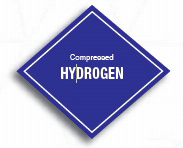
The oil-derived gasoline we use in our cars now is a liquid. Because hydrogen is a gas, it occupies a much larger volume of space than liquid gasoline. Therefore, storing hydrogen requires some special technology and specialized infrastructure to keep it safe and prevent explosions.
Hydrogen Fuel Vehicles
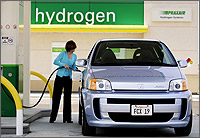
A hydrogen vehicle uses hydrogen as fuel. In a hydrogen vehicle, the hydrogen may be burned or reacted with oxygen in what is called a fuel cell. Upon reaction with oxygen in a fuel cell, the hydrogen produces water and electricity. To support hydrogen vehicles, we would need entirely new infrastructure in the U.S. We would need to build special hydrogen fuel stations for people to fuel up their cars. We would also need pipelines for transporting hydrogen from its place of production to various places all over the country.
Summing Up Hydrogen
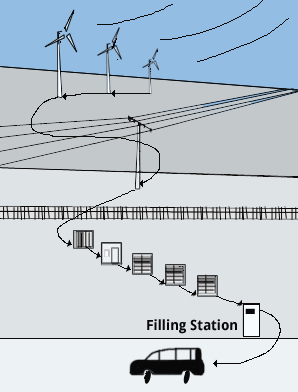
So what are the pros and cons of hydrogen fuel? On the plus side, hydrogen fuel produces no air pollution and would be completely renewable. On the negative side, the production of hydrogen requires the use of electricity, and that electricity often comes from fossil fuel-burning power plants. The production of hydrogen can cause just as much pollution as the burning of gasoline in cars. The only way around this dilemma would be to use renewable, non-polluting energy sources to produce the electricity used to produce the hydrogen. Is that feasible in light of the fact that renewable energy sources currently account for just two percent of the electricity generation in the U.S.? Iceland has become the first nation to say they will transition their hydrocarbon economy to a hydrogen economy and has vowed to do so completely with clean renewable energy. Should the U.S. do the same?